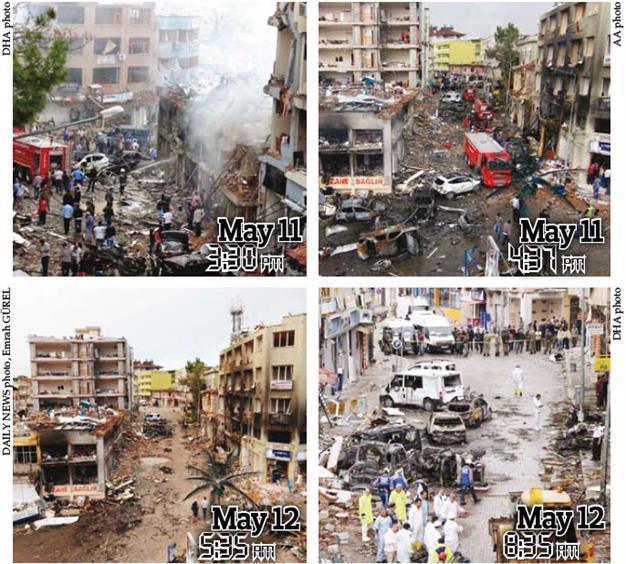Officials failed to secure Reyhanlı bombing site after blasts
ISTANBUL- Hürriyet Daily News

These four photos show the site of the bombing in Reyhanlı at different times after the attack until it was secured.
The crime scenes of the twin car-bomb attacks in the southern town of Reyhanlı remained unattended for more than half a day after the blast, posing large risks to the evidence about one of the most deadly terror attacks the country has ever witnessed.Reyhanlı’s district police chief Murat Berk and top commander Colonel Mustafa Başoğlu have both been removed from their posts. However it was not clear if the decision was linked to the blast. Başoğlu was subsequently appointed to a post in İzmir. The Daily News could not access Berk yesterday via phone.
Two Daily News reporters, who arrived on the spot in the very early hours of the next day, spent the night on a neglected street where the large crater left by the bomb was overseen by only one police officer.
Only a single police officer was standing guard by the bombed area in the town center which was totally open to passers-by without any police tape cordoning it off, when the Hürriyet Daily News arrived in Hatay’s Reyhanlı only hours after the attack at 03.00 am, on May 12.
Police chief was informed: Source
No soldiers, gendarmerie forces or police had set up a control point to check the cars coming out of the town as the Daily News reached Reyhanlı via the main roads to the city. The attackers also used the main roads with two cars full of explosives only 14 hours before.
A local authority told the Daily News yesterday that a group led by Berk had been informed one day before the blasts about the matter. He was speaking on condition of anonymity as he was not authorized to comment.
“We, police intelligence, had known since May 8 that such an incident could happen. We prompted the [security forces] and almost without sleeping worked to stop it,” he said.
On May 10, at 8:50 p.m., Reyhanlı Police knew that the attack was going to happen.
“The vehicles entered the town one after the other, the gendarmerie should have taken camera measures at every entrance to the town,” he added.
“Human body parts and some fingers parted from the victims were found at the crime scene even four days after the blasts,” another local official confirmed to the Hürriyet Daily News, on condition of anonymity because of the sensitivity of the issue on May 15. Legal authorities and law enforcement have taken charge after the incident. The area was under their responsibility, he said.
The police surrounded the area in the morning of May 12 when locals and the other press members returned to the location and three new dead bodies, one in the building next to the municipality complex and two on the road before the post office, were found.
‘Crowd broke security chain’
It was the citizens, press members and deputies who broke the police circle and entered the area, Hatay Governor Celalettin Lekesiz’s press consultant Vahit Harputoğlu told the Daily News via phone May 17.
“Imagine you are a deputy, you go there, and you are being told that it was not appropriate to enter there, and you go on,” he said, hinting at Kemal Kılıçdaroğlu and his deputies.
The main opposition Republican People’s Party (CHP) leader Kemal Kılıçdaroğlu and his senior party officials stood near the building when the police and rescue teams continued their efforts to pull out two bodies from the sewage in front of the post office. Nearly 1,000 people were also standing alongside them.
A walk on crime scene
Sevil Atasoy, an expert in forensic medicine, said even TV broadcasts had showed some people wandering around the crime scene while the police stood idly by them.
Atasoy said Turkey should have taken lessons from the efforts of the crime scene investigators working on the Boston bombings on April 15.
The police drew a line for press and people. Atasoy said a media ban was not necessary for Reyhanlı bombings but proper security was crucial, which Turkish police and officials apparently failed to provide.
However, hundreds of police officers were dispatched to the town on May 12 from the neighboring province of Adana later.
The police were then placed on every corner, especially near the buildings in which Syrian refugees were staying, as they became the target of a number of angry mobs.
















